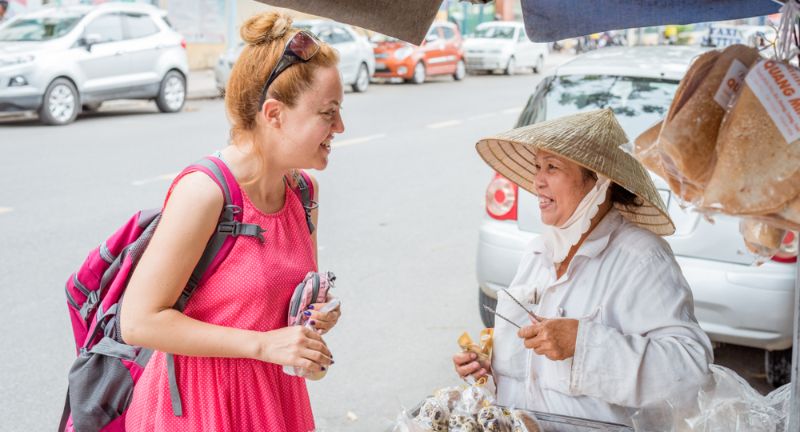TRAVEL
Travel Etiquette: 25 Strange Customs Every Traveler Should Know
Published
9 months agoon

Shutterstock
Traveling the world offers the unique opportunity to immerse yourself in diverse cultures and traditions. However, understanding and respecting local customs is crucial to having a positive and respectful experience. Many countries have unique practices that might seem unusual to outsiders but hold deep cultural significance. This guide explores 25 strange customs from around the globe that travelers should be aware of. By familiarizing yourself with these traditions, you can ensure a smoother and more enriching travel experience.
Japan: Bowing Etiquette

Shutterstock
In Japan, bowing is a common greeting and sign of respect. The depth and duration of the bow depend on the social status of the person you are greeting. A slight nod is sufficient for casual acquaintances, while a deeper, longer bow is reserved for superiors or elders. It’s a deeply ingrained custom reflecting the importance of hierarchy and respect in Japanese culture.
Thailand: Don’t Touch the Head

Shutterstock
In Thailand, the head is considered the most sacred part of the body. Touching someone’s head is seen as highly disrespectful, even when done playfully or affectionately. This belief stems from the Buddhist view that the head is the seat of the soul. Always be mindful to avoid patting a child on the head or touching anyone’s head.
India: Eat with Your Right Hand

Shutterstock
In India, eating with your right hand is customary, as the left hand is considered unclean. This practice is rooted in traditional Hindu beliefs where the left hand is reserved for personal hygiene. Using the right hand for eating and other respectful activities is a sign of cleanliness and cultural adherence. Visitors should practice this to show respect for local customs.
South Korea: Pouring Drinks

Shutterstock
In South Korea, it’s polite to pour drinks for others rather than yourself. When pouring or receiving a drink, always use both hands as a sign of respect. This custom emphasizes the importance of communal dining and respect for your companions. Additionally, elders should be served first, and it’s polite to wait until they begin drinking.
China: Accepting Gifts

Shutterstock
In China, it is polite to refuse a gift three times before finally accepting it. This ritual demonstrates humility and gratitude, showing that the recipient does not appear greedy. Once accepted, it’s customary to open the gift later rather than in front of the giver. This practice avoids any potential embarrassment or awkwardness if the gift is modest or unexpected.
France: Say Hello Properly

Shutterstock
In France, it is very important to greet shopkeepers and others with a polite “Bonjour” (Good day) before any interaction. This small gesture shows respect and acknowledgment. Failing to do so can be seen as rude or dismissive. Always remember to greet people properly to create a positive impression.
Russia: No Smiling in Public

Shutterstock
In Russia, smiling at strangers in public is often seen as insincere or even suspicious. Smiling is reserved for genuine emotions and among friends and family. Russians may perceive unnecessary smiling as a lack of seriousness or even a sign of deceit. Be mindful of your facial expressions to respect local cultural norms.
Philippines: Point with Your Lips

Shutterstock
In the Philippines, people often point to objects with their lips rather than their fingers. This gesture, known as “nguso,” involves puckering the lips in the direction of the object or person. It’s a subtle and polite way of indicating something without using hands. Understanding this practice can help you communicate more effectively with locals.
Greece: No Thumbs Up

Shutterstock
In Greece, the thumbs-up gesture is considered rude and offensive. This gesture, commonly positive in many cultures, has a negative connotation similar to the middle finger in Greece. Instead, use a thumbs-up with a closed fist to avoid misunderstanding. Being aware of this can help prevent accidental insults.
Italy: Don’t Order Cappuccino After 11 AM

Shutterstock
In Italy, drinking cappuccino after a meal or in the afternoon is considered unusual. Italians believe that milk disrupts digestion, so cappuccino is typically enjoyed only in the morning. After 11 AM, switch to espresso to fit in with local customs. Understanding this habit will enhance your dining experience in Italy.
Kenya: Spitting as a Greeting

Shutterstock
Among the Maasai people of Kenya, spitting is a traditional greeting and a sign of respect. Elders may spit on their hands before shaking hands to bestow blessings. It’s also a way to greet newborns, wishing them good fortune. While it may seem unusual, this practice holds deep cultural significance.
New Zealand: The Hongi Greeting

Shutterstock
In New Zealand, the traditional Māori greeting, known as the hongi, involves pressing noses and foreheads together. This act symbolizes the sharing of breath, representing unity and the life force. The hongi is often exchanged during formal ceremonies and meetings. Understanding and participating in this greeting can show respect for Māori culture.
Malaysia: Point with Your Thumb

Shutterstock
In Malaysia, it is considered impolite to point with your index finger. Instead, use your thumb with the rest of your fingers folded beneath. This gesture is more polite and respectful. Understanding and using this practice will help you blend in and show respect for local customs.
Norway: Silent Meals

Shutterstock
In Norway, it’s common to have silent meals. Norwegians appreciate the quiet and consider it rude to speak with food in your mouth. This practice allows for mindful eating and enjoying the meal. Respecting this custom can make dining experiences more pleasant and harmonious.
Turkey: The Nazar

Shutterstock
In Turkey, the Nazar (evil eye charm) is a common protective symbol. Avoid making comments that might be interpreted as casting the evil eye. Compliments should be followed by a protective gesture or phrase to ward off bad luck. Understanding this belief can help you navigate social interactions more smoothly.
South Africa: Don’t Assume English

Shutterstock
South Africa has 11 official languages, and it’s polite to inquire which language someone prefers to speak. Assuming everyone speaks English can be seen as disrespectful. Being open to other languages shows cultural sensitivity and respect. This practice can enhance communication and foster better relationships.
Argentina: Punctuality is Flexible

Shutterstock
In Argentina, arriving exactly on time for social events is unusual. Being fashionably late is the norm, allowing for a more relaxed and flexible schedule. This custom reflects the Argentine approach to time, which prioritizes relationships over strict punctuality. Embracing this can help you fit in better with local social norms.
Spain: Siesta Time

Shutterstock
In Spain, many businesses close in the afternoon for a siesta. It’s customary to respect this break and not expect services during this time. The siesta allows people to rest and recharge, especially in the hot afternoon. Understanding and accommodating this tradition can enhance your travel experience in Spain.
Egypt: Remove Shoes

Shutterstock
In Egypt, it’s polite to remove your shoes before entering someone’s home. This practice shows respect for the household and helps keep the home clean. It’s a common custom in many Middle Eastern cultures. Always look for cues or ask your host to ensure you’re following proper etiquette.
Brazil: Thumbs Up is Positive

Shutterstock
Unlike Greece, in Brazil, the thumbs-up gesture is positive and widely used. It’s a common way to signal approval or agreement. This gesture is understood universally in Brazil and won’t cause any offense. Feel free to use it in your interactions to convey positivity.
Mexico: Say “Buen Provecho”

Shutterstock
In Mexico, it’s polite to say “Buen provecho” (Enjoy your meal) to people dining around you. This phrase is used similarly to “Bon appétit” in French. It’s a courteous gesture that enhances the communal dining experience. Use it to show your appreciation for the local dining customs.
Chile: Always Use a Knife and Fork

Shutterstock
In Chile, it’s considered bad manners to eat with your hands, even for foods like pizza. Always use a knife and fork to show proper etiquette. This custom highlights the Chilean emphasis on dining decorum. Following this practice can make your dining experiences more respectful and enjoyable.
Germany: Don’t Cross Your Fingers

Shutterstock
In Germany, crossing your fingers for luck is considered rude and offensive. This gesture, which is positive in many cultures, is best avoided in Germany. Instead, use the local gestures and customs to convey good wishes. Being aware of this can help prevent misunderstandings and show cultural sensitivity.
Saudi Arabia: Coffee Etiquette

Shutterstock
In Saudi Arabia, when served Arabic coffee, shake your cup side to side to indicate you don’t want a refill. This subtle gesture helps manage the social custom of continuous refilling. If you want more coffee, simply hold your cup out to the server. Understanding these nuances shows respect for Saudi hospitality traditions.
Hungary: Don’t Clink Glasses

Shutterstock
In Hungary, it’s customary not to clink beer glasses together as a toast. This tradition dates back to a historical event where the clinking of beer glasses was associated with a national tragedy. Instead, make eye contact and raise your glass for a toast. Understanding this custom can help you respect Hungarian sensitivities and traditions.
Conclusion

Shutterstock
Understanding and respecting the customs of the countries you visit is key to being a considerate and culturally aware traveler. While some practices might seem strange at first, they offer valuable insights into the values and traditions of different cultures. By embracing these customs, you can deepen your connections with local people and enhance your travel experiences. Remember, travel is not just about seeing new places, but also about learning and growing through new experiences. Respectful travel fosters mutual understanding and appreciation, making the world a more connected and harmonious place.
More From Bon Voyaged
-


2024 Predicted to Be Busiest Travel Year Ever by Travel…
-


Paris Hilton Celebrates Marriage with Honeymoon World Tour
-


Disneyland Fan Sets World Record for Visiting Park 2,995 Days…
-


Tight Vacay Budget? Here’s How to do a Staycation in…
-


How To Be A Polite Traveler
-


The World’s Most Expensive Destinations Revealed
-


This ‘Fantasmic’ Disney Experience is Making a Return!
-


Five Tips to Help Combat Fear of Flying
-


New Mega Theme Park Set to Open Near Cancun, Mexico
-


TSA Confiscated a Record Number of Guns in 2022
-


Travel+Leisure Announces The Top Ten US Cities
-


Woman’s Budget Travel Hack Goes Viral

